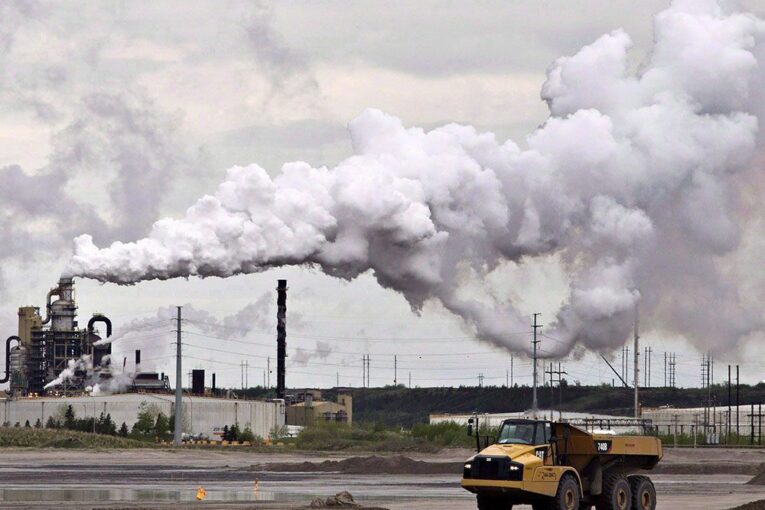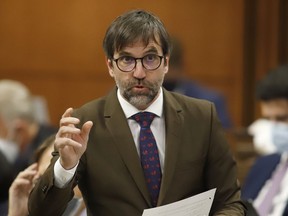
A full-scale energy crisis is erupting in Europe, while President Joe Biden’s climate ambitions are eroding south of the border.
In Canada, the federal government is charging ahead in its own direction, opening up consultations on its pledge to establish a new cap on greenhouse gas emissions from the country’s oil and gas sector.
“I’m a little amazed by the timing of it,” said Alberta Energy Minister Sonya Savage.
“It’s tone deaf from the federal government to be pushing this at a time when the world is looking for more energy. And it’s looking like in Europe, they’re going to be rationing natural gas over the winter … and yet we’re punishing oil and gas workers, and the oil and gas industry in Canada.”
Federal Environment Minister Steven Guilbeault kicked off consultations this week on the Liberal government’s discussion paper surrounding a new emissions cap to be placed on the oil and gas industry.
During last year’s federal election, the Liberals pledged to establish such a limit on the single-largest emitting sector in the country as the country pursues a net-zero target by 2050, and steep interim cuts by 2030.
Today, details matter, particularly for an industry that employs thousands of Canadians and needs to invest billions of dollars to lower its greenhouse gas emissions.
Modelling in the federal government’s emissions reduction plan unveiled this spring projected industry emissions will fall by 42 per cent (from 2019 levels) by 2030, although the actual trajectory of the drop — and details of the policy — must still be sorted out.
The new discussion document lays out two key options.
Ottawa could adopt a cap-and-trade system and set a hard limit on industry emissions, establishing a total quota of allowable emissions, which would fall over time. This would give the feds more ability to reach whatever final target it sets, although it would create a new regulatory structure.
The other alternative would affect the existing carbon price for the industry.
Presumably, a higher industry-specific carbon price could be introduced, if needed, to incent companies to lower emissions, but this option would offer the government less ability to ensure specific targets are reached.
“This is a strange development. It looks like the government wants to add a whole separate, supplemental energy tax to the carbon tax … this would lead us to believe that they’re already expecting their primary policy to fail,” said Michael Belenkie, CEO of Advantage Energy Ltd. and subsidiary Entropy Inc., a carbon capture and storage developer.
“Europe is in a full-blown energy crisis and any suppression or disincentives on Canadian natural gas or oil production will result in more coal being burned in Europe and Asia with much higher emissions.”
Belenkie and industry analysts believe either option would increase costs and make it more difficult for the Canadian industry to grow production — and could stifle some output.
Industry groups are now examining what the two alternatives would mean.
“We have some concerns about the fairness and making sure that one industry isn’t singled out, but we recognize we’re a contributor on the GHG piece,” said Tristan Goodman, president of the Explorers and Producers Association of Canada.
The industry has been saying for months it will work with the Trudeau government on the plan. Last summer, the country’s largest oilsands producers formed a group to get to net-zero by 2050.
However, the Pathways Alliance also voiced trepidation this week about where the new cap could be heading.
“Both policy options as currently described would be more ambitious than what can be realistically achieved,” alliance president Kendall Dilling said in a statement.
In an interview Wednesday, Guilbeault didn’t seem phased by any criticism.
The exact reduction target for the sector by 2030 hasn’t been established, but will be “in line” with the 42 per cent drop mentioned in Ottawa’s emissions reduction plan, he said.
Expect pressure to grow on the federal government to provide more certainty to companies — and the province — on the emissions targets as energy security concerns mount across the world.

On Wednesday, the European Union recommended countries in the group voluntarily reduce their gas consumption by 15 per cent, beginning next month until March. It cited concerns Russia is using energy as a weapon and will reduce gas supplies.
Earlier this week, the executive director of the International Energy Agency (IEA) wrote that “the world is experiencing the first truly global energy crisis in history.” Meanwhile, the Biden administration’s climate plans appear increasingly uncertain given domestic politics in the United States.
The world has changed since the oilpatch emissions cap was first promised in the 2021 federal election and that needs to be acknowledged, said Richard Masson, an executive fellow at the University of Calgary’s School of Public Policy.
“Canada is one of the few places where we can get oil and gas (from) a secure supplier,” said Masson, former CEO of the Alberta Petroleum Marketing Commission.
“We need to be able to offset Russian energy. That is not increasing overall emissions in the world.”
Meanwhile, inflation in Canada climbed by 8.1 per cent in June, powered by rising energy expenses.
Even if energy prices keep rising, Guilbeault said he wouldn’t change the timelines or delay the cap, noting Canada needs “to deploy these measures in order to be able to achieve our international commitments.”
Asked about the energy crisis, he pointed out that countries and citizens are suffering from climate change, such as the heat wave now unfolding in the United Kingdom and southern Europe.
“There will always be short-term issues that are important that we need to pay attention to,” the federal environment minister said.
“We need to work on these issues, but not at the expense of what we’re doing on climate change, because climate change won’t go away.”
From the Alberta government’s vantage point, Savage points to the contradiction of the federal government moving ahead on a cap, while calling for the sector to pump out more oil and gas this year to help Canada’s allies shift off of Russian energy.
“We have a dysfunctional energy policy in North America and Europe that’s focused exclusively on climate policy and not energy security, reliability and affordability,” she added.
“We need to double down … on ways to actually reduce emissions, and stop being so focused on reaching a specific target.”
Chris Varcoe is a Calgary Herald columnist.
You can read more of the news on source
